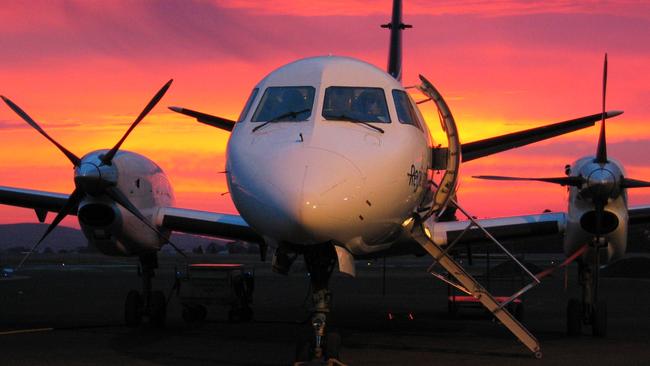Rex calls ASX trading halt as concerns grow over regional fleet
The airline has called a halt to trading on the ASX at a time when it has a third of its regional fleet parked.

Business
Don't miss out on the headlines from Business. Followed categories will be added to My News.
Rex has called a halt to trading on the ASX pending an announcement by the airline, which currently has a third of its regional fleet parked.
19 of Rex’s 58 Saab 340s are out of action, which deputy chairman John Sharp attributed to logistics and supply issues.
The number of aircraft on the ground has steadily increased since Rex announced a reduction in regional services in late April.
At the time, a chronic pilot shortage and supply chain disruption were blamed for the cuts, affecting routes in remote parts of Queensland, NSW, Victoria and South Australia.
Services were expected to be reinstated in late June, but no further update has been forthcoming.
Mr Sharp confirmed the airline was continuing to face challenges, that were keeping a significant number of Saab 340s parked.
The airline’s fleet of seven Boeing 737s remained operational, with one currently undergoing routine maintenance.
Two more 737s were due to be added to the fleet in June and July, increasing operational resilience and allowing new daily flights between Adelaide and Sydney to begin at month’s end.
At Rex’s half year results, the airline said regional operations had been a “drag” on the group’s financial performance but were expected to return to profit by the end of March.
No further guidance has been provided since then.
Rex shares last traded at $1.21, down from a high of $2.06 in late 2020 when the airline unveiled plans to expand onto major city routes with the backing of investment firm PAG.
Under the deal, PAG was to provide Rex with up to $150m to support the jet operations.
Once the full amount was drawn down by Rex, PAG would hold a 48 per cent stake in the carrier, which entitled the firm to two board seats.
Originally published as Rex calls ASX trading halt as concerns grow over regional fleet





